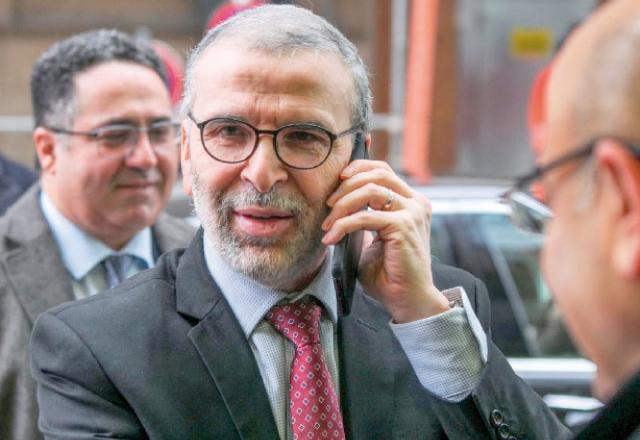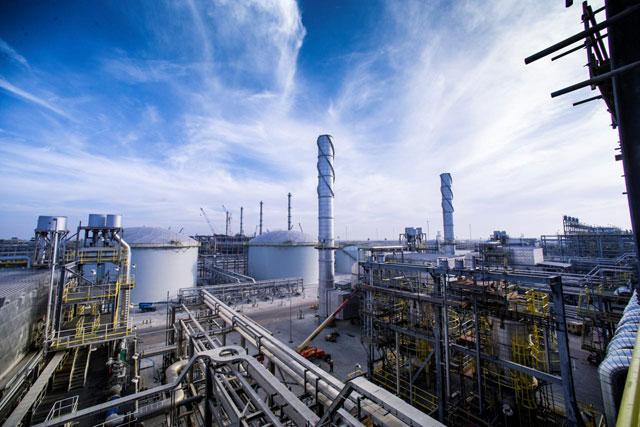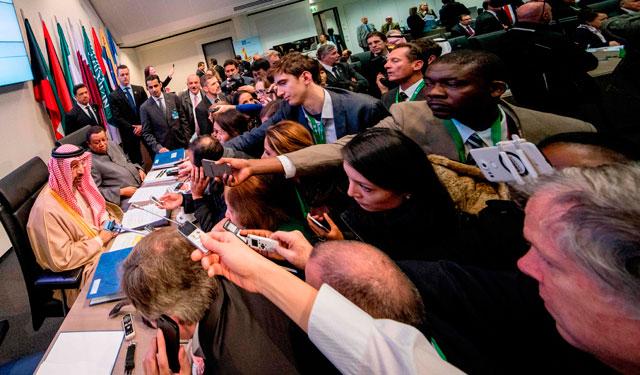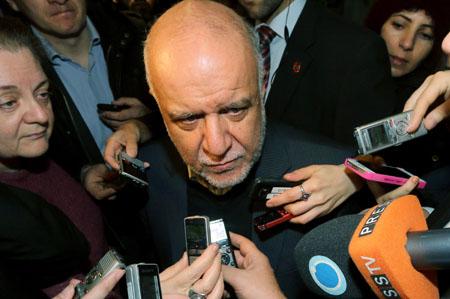You are here
OPEC considers deeper output cuts as global growth slows
By AFP - Dec 06,2019 - Last updated at Dec 06,2019

Mustafa Sanalla, chairman of the National Oil Corporation of Libya, uses his phone as he arrives for the 177th Organisation of Petroleum Exporting Countries meeting in Vienna, Austria, on Thursday (AFP photo)
VIENNA — Major oil exporting countries started meeting in Vienna on Thursday amid speculation they are seeking to deepen output cuts as slowing global economic growth and abundant reserves put pressure on oil prices.
The cuts of 1.2 million barrels per day from October 2018 levels were originally fixed in December last year and were already extended at the last meeting of the Organisation of Petroleum exporting Countries (OPEC) in July.
But Iraqi Oil Minister Thamer Ghadban on his arrival on Tuesday in Vienna suggested some members would push for output to be slashed by an additional 400,000 barrels per day.
Some observers say fresh production cuts and a boost to prices would suit Saudi Arabia as it tries to support the initial public offering (IPO) of its national oil company Aramco.
"I'm expecting a successful meeting," Prince Abdulaziz Bin Salman told reporters as he arrived for his first OPEC gathering as Saudi oil minister.
Other oil ministers were unusually tight-lipped as they arrived for the two-day meeting.
Earlier on Thursday, the Saudi prince — half-brother of the kingdom's powerful Crown Prince Mohammed Bin Salman — met Russian Energy Minister Alexander Novak, according to a statement by Russia's energy ministry.
Novak praised the two countries' "important existing dialogue" as the two men discussed their cooperation to control world oil prices with other OPEC countries and economic relations.
The big unknown in the run-up to the meetings has been the position of Russia.
The world's second-biggest producer, which since late 2016 has been part of the so-called OPEC+ grouping, admitted on Tuesday that it had missed its monthly target for cuts in November for the eighth time this year.
Iraq and Nigeria — Africa's biggest producer — have also regularly been exceeding their quotas.
'No climate
change deniers'
Ahead of Thursday's meeting, dozens of climate change activists gathered outside the OPEC headquarters in a silent protest, holding banners that read: "Burn injustice not oil" and "Fossil fuels have got to go".
OPEC Secretary General Mohammed Barkindo — who called climate change activists the "greatest threat" to the oil industry during the organisation's last meeting in July — received several of them, assuring that "there are no climate change deniers in OPEC".
"I'm happy that you are here and we will continue with our dialogue," he said.
OPEC members may well be tempted to follow a cautious course by a forbidding global economic context.
The trade war with the US is acting as a drag on growth in China, normally an avid consumer of oil, while the European economy is also stagnating.
Moreover, the output of oil producers outside OPEC is breaking records: the US has been the world's biggest producer since 2018, Brazil and Canada have also increased output and others such as Norway are planning to do so.
According to the latest US estimates, the country's total domestic stocks now stand at an enormous 452 million barrels.
Analysts say that, taken together, these factors will leave OPEC little room for manoeuvre if it wants to fulfil its stated aim of securing "fair and stable prices for petroleum producers".
Prices have held relatively steady since the last OPEC meeting, with a barrel of Brent crude hovering around the $60 mark, apart from a spike in September sparked by attacks on Saudi oil installations.
While this is a comfortable price for the likes of Russia, whose 2019 budget is predicated on a price of around $42 a barrel, it is too low for countries such as Saudi Arabia.
On the eve of the summit, oil prices finished the day's trading on a high, with the European benchmark of Brent up by 3.6 per cent and its American equivalent WTI 4.2 per cent higher.
Further cuts?
Saudi Arabia has stayed within the quota it had been assigned under the current deal and in September urged its partners to do the same.
Meanwhile, the Aramco IPO has been delayed several times with the bidding period closing on Wednesday.
While investors have baulked at Aramco's valuation of around $1.7 trillion, this is still less than Saudi authorities were hoping for.
Related Articles
DUBAI/LONDON — Saudi Arabia’s plans to float state oil titan Aramco are prompting the country to think the unthinkable. Late last year,
VIENNA — The Organisation of Petroleum Exporting Countries (OPEC) agreed on Thursday to extend oil output cuts until the end of 2018 a
Organisation of Petroleum Exporting Countries (OPEC) Gulf oil producers will not propose an output cut on Thursday, reducing the likelihood of joint action by OPEC to prop up prices that have sunk by a third since June and raising the prospect of a global oil price war.



















